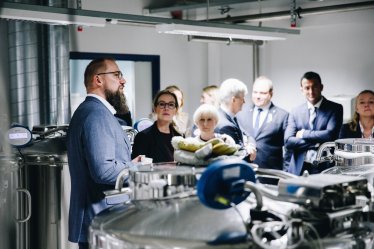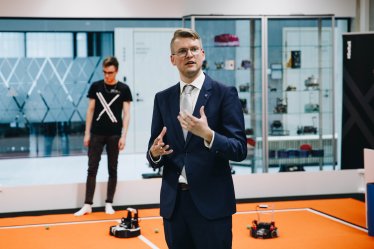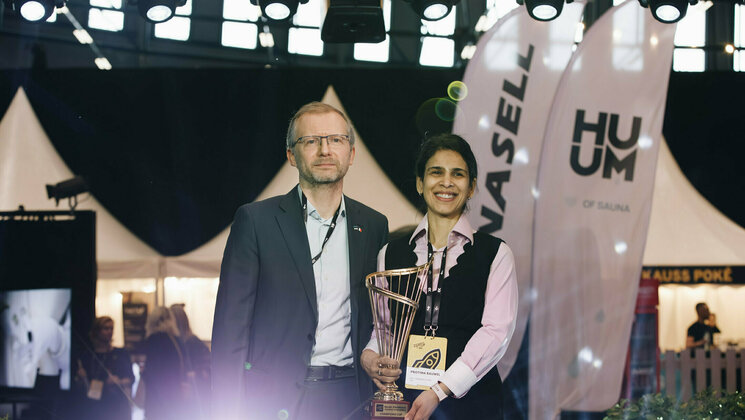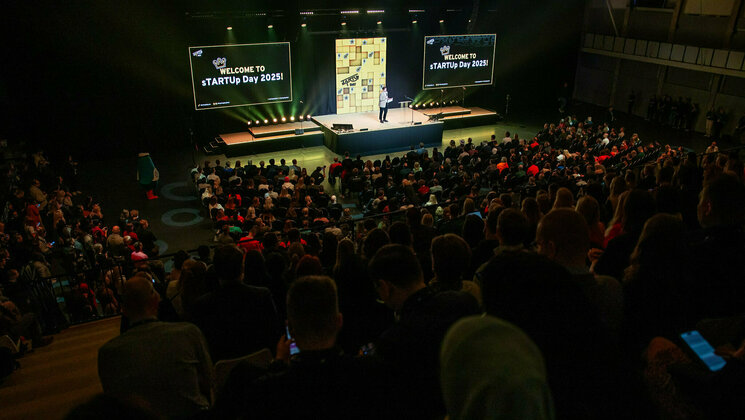-
Faculty of Arts and HumanitiesDean's Office, Faculty of Arts and HumanitiesJakobi 2 ruumid 116–121, 51005 Tartu linn, EST0Institute of History and ArchaeologyJakobi 2 51005 Tartu linn, Tartu linn, Tartumaa EST0Institute of Estonian and General LinguisticsJakobi 2, IV korrus 51005 Tartu linn, Tartu linn, Tartumaa EST0Institute of Philosophy and SemioticsJakobi 2, III korrus, ruumid 302-337 51005 Tartu linn, Tartu linn, Tartumaa EST0Institute of Cultural ResearchÜlikooli 16 51003 Tartu linn, Tartu linn, Tartumaa EST0Institute of Foreign Languages and CulturesLossi 3 51003 Tartu linn, Tartu linn, Tartumaa EST0School of Theology and Religious StudiesÜlikooli 18 50090 Tartu linn, Tartu linn, Tartumaa EST0Viljandi Culture AcademyPosti 1 71004 Viljandi linn, Viljandimaa EST0Professors emeriti, Faculty of Arts and Humanities0Associate Professors emeriti, Faculty of Arts and Humanities0Faculty of Social SciencesDean's Office, Faculty of Social SciencesLossi 36 51003 Tartu linn, Tartu linn, Tartumaa EST0Institute of EducationJakobi 5 51005 Tartu linn, Tartu linn, Tartumaa EST0Johan Skytte Institute of Political StudiesLossi 36, ruum 301 51003 Tartu linn, Tartu linn, Tartumaa EST0School of Economics and Business AdministrationNarva mnt 18 51009 Tartu linn, Tartu linn, Tartumaa EST0Institute of PsychologyNäituse 2 50409 Tartu linn, Tartu linn, Tartumaa EST0School of LawNäituse 20 - 324 50409 Tartu linn, Tartu linn, Tartumaa EST0Institute of Social StudiesLossi 36 51003 Tartu linn, Tartu linn, Tartumaa EST0Narva CollegeRaekoja plats 2 20307 Narva linn, Ida-Virumaa EST0Pärnu CollegeRingi 35 80012 Pärnu linn, Pärnu linn, Pärnumaa EST0Professors emeriti, Faculty of Social Sciences0Associate Professors emeriti, Faculty of Social Sciences0Faculty of MedicineDean's Office, Faculty of MedicineRavila 19 50411 Tartu linn, Tartu linn, Tartumaa ESTInstitute of Biomedicine and Translational MedicineBiomeedikum, Ravila 19 50411 Tartu linn, Tartu linn, Tartumaa ESTInstitute of PharmacyNooruse 1 50411 Tartu linn, Tartu linn, Tartumaa ESTInstitute of DentistryL. Puusepa 1a 50406 Tartu linn, Tartu linn, Tartumaa ESTInstitute of Clinical MedicineL. Puusepa 8 50406 Tartu linn, Tartu linn, Tartumaa ESTInstitute of Family Medicine and Public HealthRavila 19 50411 Tartu linn, Tartu linn, Tartumaa ESTInstitute of Sport Sciences and PhysiotherapyUjula 4 51008 Tartu linn, Tartu linn, Tartumaa ESTProfessors emeriti, Faculty of Medicine0Associate Professors emeriti, Faculty of Medicine0Faculty of Science and TechnologyDean's Office, Faculty of Science and TechnologyVanemuise 46 - 208 51003 Tartu linn, Tartu linn, Tartumaa ESTInstitute of Computer ScienceNarva mnt 18 51009 Tartu linn, Tartu linn, Tartumaa ESTInstitute of GenomicsRiia 23b/2 51010 Tartu linn, Tartu linn, Tartumaa ESTEstonian Marine Institute0Institute of PhysicsInstitute of ChemistryRavila 14a 50411 Tartu linn, Tartu linn, Tartumaa EST0Institute of Mathematics and StatisticsNarva mnt 18 51009 Tartu linn, Tartu linn, Tartumaa EST0Institute of Molecular and Cell BiologyRiia 23, 23b - 134 51010 Tartu linn, Tartu linn, Tartumaa ESTTartu ObservatoryObservatooriumi 1 61602 Tõravere alevik, Nõo vald, Tartumaa EST0Institute of TechnologyNooruse 1 50411 Tartu linn, Tartu linn, Tartumaa ESTInstitute of Ecology and Earth SciencesJ. Liivi tn 2 50409 Tartu linn, Tartu linn, Tartumaa ESTProfessors emeriti, Faculty of Science and Technology0Associate Professors emeriti, Faculty of Science and Technology0Institute of BioengineeringArea of Academic SecretaryHuman Resources OfficeUppsala 6, Lossi 36 51003 Tartu linn, Tartu linn, Tartumaa EST0Area of Head of FinanceFinance Office0Area of Director of AdministrationInformation Technology Office0Administrative OfficeÜlikooli 17 (III korrus) 51005 Tartu linn, Tartu linn, Tartumaa EST0Estates Office0Marketing and Communication OfficeÜlikooli 18, ruumid 102, 104, 209, 210 50090 Tartu linn, Tartu linn, Tartumaa EST0Area of Vice Rector for DevelopmentCentre for Entrepreneurship and InnovationNarva mnt 18 51009 Tartu linn, Tartu linn, Tartumaa EST0University of Tartu Natural History Museum and Botanical GardenVanemuise 46 51003 Tartu linn, Tartu linn, Tartumaa EST0International Cooperation and Protocol Office0University of Tartu MuseumLossi 25 51003 Tartu linn, Tartu linn, Tartumaa EST0Area of RectorRector's Strategy OfficeInternal Audit OfficeArea of Vice Rector for Academic AffairsOffice of Academic AffairsUniversity of Tartu Youth AcademyUppsala 10 51003 Tartu linn, Tartu linn, Tartumaa EST0Student Union OfficeÜlikooli 18b 51005 Tartu linn, Tartu linn, Tartumaa EST0Centre for Learning and TeachingArea of Vice Rector for ResearchUniversity of Tartu LibraryW. Struve 1 50091 Tartu linn, Tartu linn, Tartumaa EST0Grant Office
Swedish business delegation visited the University of Tartu to explore its health technologies and opportunities for research-intensive entrepreneurship

During the visit of the Swedish business delegation to the University of Tartu Estonian Biobank and Delta Centre on 4 May, sustainability and resilience were discussed. One conclusion of the discussions was that Estonia has a good chance of becoming a global leader in health technologies.
The business delegation included Swedish health technology entrepreneurs and developers. Among others, AstraZeneca, Asker Healthcare Group, Carl Bennet, OneMed, Ågrenska Foundation and Business Sweden were represented.
According to Mart Maasik, Head of Entrepreneurship of the University of Tartu, we can be proud of the university's great research potential. "Sweden's leaders in health technology have shown that global success is ensured by cross-disciplinary collaboration as well as collaboration between researchers and businesses. This visit is a good opportunity for our research-intensive companies to forge international business links and create joint growth opportunities with the Swedes, with whom we also share a similar business culture," said Maasik before the visit.

The visit started with a tour of the biobank, which, with its rich dataset, offers new opportunities for companies to create healthcare services and products. Professor of Human Genomics Tõnu Esko presented the idea of the data accelerator of the Estonian Biobank, which will give the world's innovative companies and start-ups secure and controlled access to the collected gene data to create new medicines, products and services.
Then, Estonian research-intensive companies in the field of health technologies were showcased to the delegation at the Delta Centre. Evelyn Laar, Director of the Baltic Region of Asker Healthcare AB, and Anders Olauson, Chairman of the Ågrenska Foundation, discussed sustainability and resilience in healthcare. Four key messages emerged from the discussion.
- Sustainability in the health sector is only possible if it is approached holistically, including patients. Patients are not only the end-users of health services but also need to be increasingly involved in designing and planning services and access.
- Estonia has a good opportunity to take the lead in reforming the health system. Estonia has successfully developed e-health and digitised health data, and has become a role model for many other countries. However, patients must not be forgotten in developing these systems and services.
- Opportunities for applying the circular economy in medicine and the pharmaceutical industry have so far been limited. This is a serious problem that needs to be solved, given the huge amount of waste generated by hospitals and the materials required for manufacturing supplies.
- Health technology start-ups need to think beyond personal profit and aim for the well-being of society and the planet. Health policymaking needs a decade-long perspective.

At the Delta Centre, the business delegation was taken to several labs and units that play an important role as a breeding ground for deep technology companies. For example, the Intelligent Materials and Systems Lab of the Institute of Technology specialises in developing robots that interact with humans (e.g. robots used in hospitals and industrial buildings).
The Computer Graphics and Virtual Reality Lab of the Institute of Computer Science engages in teaching and research in the field of computer graphics, video game design and augmented reality. Guests were shown new solutions for tracking facial expressions and transferring them to virtual characters. Researchers presented their joint research with neuroscientists, aiming to mimic the experience of using psychedelics in a virtual environment.
The team of the Creative Destruction Lab, the international mentoring programme for research and technology-based start-ups, introduced the opportunities to support businesses developing products and services related to digital governance, health data and cybersecurity. In addition to the University of Tartu, the programme includes the University of Oxford and several North American universities.
Tartu Science Park, the office of which is located in the Delta business building, presented their activities in fostering start-up business. Triumf Health, which develops an app supporting children's mental health, shared their experience.
The SEB Innovation Centre gave an overview of the bank's new lines of action in cooperation with researchers and students. For example, the centre offers students the opportunity to conduct research based on anonymised data. This could be beneficial for both research and the bank.
The business delegation's visit ended with a concluding discussion between representatives of Enterprise Estonia and Business Sweden, where it was recognised that keeping in good contact with such nearby partners is important. The delegation members were grateful for the good organisation and interesting programme in both Tallinn and Tartu.
The visit of the business delegation was part of the state visit of King Carl XVI Gustaf and Queen Silvia of Sweden hosted by President Alar Karis.
Swedish business delegation in the University of Tartu
Read more similar news






